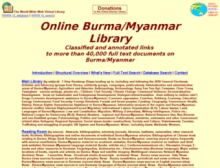Resource information
Since Myanmar opened up under the semi-civilian government in 2011, the diaspora have been encouraged to return.
As persecution on the basis of political activity or ethnicity is often the reason they left, many are reluctant to return permanently to what is an unclear political situation. As a result, brief stays are common. After so many years away from home, family and friends, it is difficult to image the experience of returning.
Twenty-four years after leaving his home for a new life in Australia, Saya Nai Tin Aye, my Burmese teacher, applied for a tourist visa to return to Myanmar. The process took longer than it does for regular tourists, as the Home Affairs, Foreign Affairs, and Immigration ministries must approve the application. It so happened that my trip to Myanmar would coincide with his. He invited me to visit his home village.
Nai Tin Aye, once president of the Australia Mon Association, is a softly spoken man, with a keen interest and knowledge of history. He has an inspiringly fastidious memory for dates. He left his home in Kawkareik Township, Kayin State in 1991. Formally a star volleyball player and school principal, he was well known and liked in the area. He also spent eight years in the armed resistance, living in the jungle and resisting the Tatmadaw (Burma Army).
In the 1990 elections, Nai Tin Aye worked for a local Mon politician. A warrant was issued for his arrest after authorities alleged irregularities in the campaign accounts. He fled to Thailand, registered with the UNHCR and was resettled in Australia in 1996. Between living in the jungle, Thailand and Australia, he has been away from his wife and three children for over 30 years.
Arriving in Nai Tin Aye’s village I was at somewhat of a loss; the place was considerably larger than I had expected, and I did not know the address. I hadn’t been able to make a telephone connection from Yangon. The motorcycle taxi driver who had reluctantly driven me out here suggested retiringly that I spend the night in a nearby town instead. We approached a group of men in a teashop, and our concerns eased. They had no doubt it was the Sayar Gyi (“principal” or “great teacher”) who we were looking for, and escorted us to his home...


